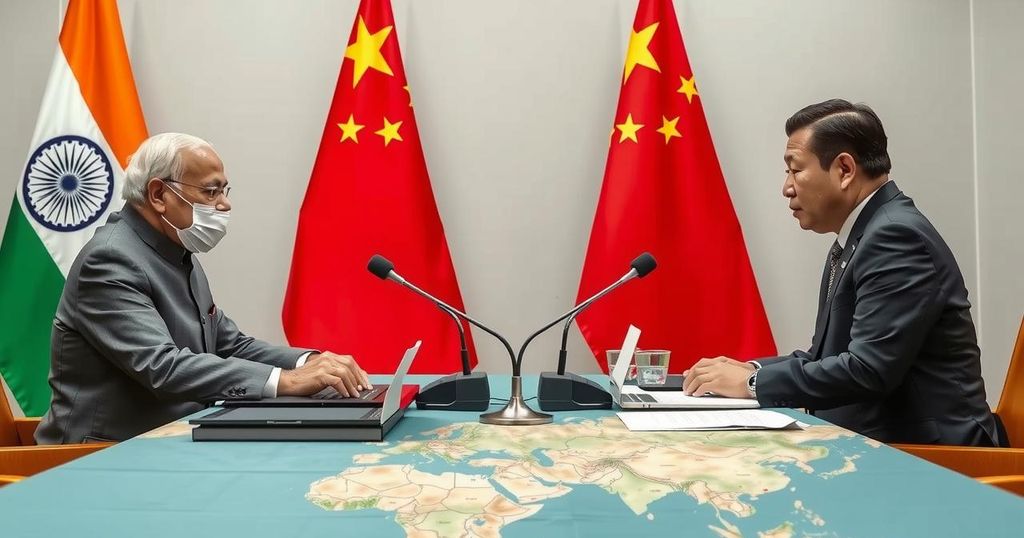Global news
ASIA, BARR, BEIJING, BILATERAL COOPERATION, BILATERAL TALKS, BORDER AFFAIRS, BRAZIL, CHINA, CHINESE FOREIGN MINISTRY, DIPLOMACY, DOVAL, EUROPE/ASIA, EXTERNAL AFFAIRS MINISTRY, FOREIGN MINISTRY, GEOPOLITICS, INDIA, KAZAN, LIN JIAN, NA, NARENDRA MODI, RUSSIA, SOUTH AMERICA, STRATEGIC PARTNERSHIP, WMCC
Jamal Walker
0 Comments
Ajit Doval and Wang Yi Discuss Peace and Bilateral Ties in Beijing
Ajit Doval and Wang Yi met in Beijing to discuss peace and bilateral relations after years of tension related to the military standoff in eastern Ladakh. The talks focused on managing peace along the LAC, rebuilding ties post-disengagement, and addressing core interests of both nations. This meeting marks the first of its kind in five years, highlighting the importance of structured engagement for resolving ongoing disputes.
National Security Advisor Ajit Doval and Chinese Foreign Minister Wang Yi convened in Beijing on Wednesday to discuss various matters, including the management of peace along the Line of Actual Control (LAC) and the potentially restored bilateral relations following a prolonged military standoff in eastern Ladakh. Mr. Doval, leading the Indian delegation, traveled to Beijing to engage in the 23rd round of talks after a five-year hiatus since their last meeting in Delhi in 2019.
The discussions commenced at 10 a.m. local time and focused on rebuilding ties post the October 21 disengagement agreement, which aimed at de-escalating tensions along the LAC. China’s Foreign Ministry expressed optimism about the talks, indicating Beijing’s readiness to collaborate with India to actualize the commitments derived from the October meeting between Prime Minister Narendra Modi and President Xi Jinping.
During a media briefing, Chinese Foreign Ministry spokesperson Lin Jian articulated that China is willing to address its differences earnestly and emphasized the importance of fostering mutual trust through continuous dialogue and communication. The agenda of the Special Representatives included the exploration of a fair and reasonable solution to long-standing boundary disputes, as previously agreed upon by the leaders during their meeting in Kazan.
Prior to this round of talks, there had been limited interactions between the two nations, barring trade relations, since the military confrontation that began in 2020, which escalated severely after a deadly clash in the Galwan Valley. The recent disengagement agreement culminated in the resolution of issues at the Demchok and Depsang friction points, marking a crucial step in normalizing relations.
This meeting holds significance as it marks the first structured dialogue aimed at restoring India-China relations since the start of the standoff, dating back several years. Established in 2003 to methodically address the extensive India-China border dispute, the Special Representatives mechanism has convened 22 times previously, serving as a critical tool for both nations in addressing recurring tensions, despite past challenges in achieving substantial resolutions to the border disagreement.
The relationship between India and China has been significantly strained due to ongoing border disputes, particularly following the military standoff that commenced in May 2020. The increased tensions culminated in the violent clash at Galwan Valley, which resulted in heightened hostilities and a virtual cessation of diplomatic relations, except for trade. The necessity of re-establishing dialogue was underscored by the leaders’ meeting during the recent BRICS summit, leading to the initiation of these Special Representatives talks.
The dialogue between National Security Advisor Ajit Doval and Foreign Minister Wang Yi signifies a pivotal moment in India-China relations, aiming to restore peace and address long-standing border issues. With China expressing a sincere interest in restoring amiable ties based on mutual respect, the outcome of these dialogues will be crucial in determining the trajectory of bilateral relations moving forward. Both nations are optimistic about stepping towards a stable and cooperative future.
Original Source: www.ndtv.com




Post Comment